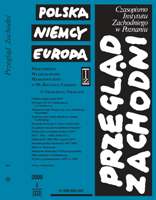Zaangażowanie Niemiec na rzecz stabilizacji Macedonii
Germany’s Involvement in the Stabilization of Macedonia
Author(s): Patrycja SokołowskaSubject(s): Politics / Political Sciences
Published by: Instytut Zachodni im. Zygmunta Wojciechowskiego
Summary/Abstract: The FRG authorities, in contrast to their position of 1991-1993, when they feared the reaction of Greece and other countries of the European Communities and so refused to recognize Macedonia, in the face of the Albanian-Macedonian conflict of 2001 explicitly supported the Macedonia government. In consequence, together with the other member states of the EU and NATO they engaged in the process or reestablishing peace in the region. The stance then adopted by Germany was characterized by the so-called double strategy. Following its guidelines, the German authorities condemned the actions of Albanian separatists and opted for maintaining the territorial integrity of Macedonia, emphasizing at the same time the necessity to grant Albanians full rights based on their status of national minority and the need to create a multicultural society. This obvious interest in the problems of Macedonia and the status of the Albanian population in this country probably stemmed not only from the wish to lend credence to Germany’s foreign policy but also from fear of another wave of refugees flooding the FRG. Economic factors are not be disregarded either. In consequence of all those factors the Bundeswehr forces took part in separating the sides of the conflict and supervising the truce. Direct involvement of the German troops became a basis for developing a new quality in the mode of implementation of Germany’s foreign policy and security. Namely, it gave rise to the concept of preventing crises through a cooperation of diplomatic, civil and military components.
Journal: Przegląd Zachodni
- Issue Year: 331/2009
- Issue No: 04
- Page Range: 35-64
- Page Count: 30
- Language: Polish

